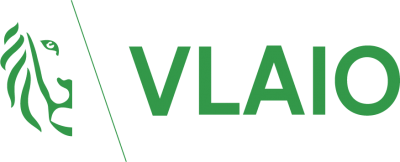Topics
We organise our actions in six thematic & strategic agendas:
Strategic Agendas:
Bio-economy
Circular Construction
Chemicals/Plastics
Manufacturing Industry
Food Chain
Water Cycles
Seven leverages provide additional support:
Leverage effects:
Lever Policy Instruments
Lever Circular Procurement
Lever Communication
Lever Innovation & Entrepreneurship
Lever Financing
Lever Jobs & Skills
Lever Research
What, why and how?
Why are we pursuing a circular economy?
Future visions 2050
How do we see our circular future?
About our management
Who steers what at Flanders Circular?
UNIR
by-product from air scrubbers in biogas plants and pigsties as a substitute for chemical fertiliser
Many farmers in Flanders use a chemical air scrubber in their stables to reduce ammonia emissions. Also in biogas installations, where manure is dried, the exhaust air can be 'washed' with sulphuric acid. The by-product of this air scrubbing is discharge water containing ammonium sulphate.
With the UNIR project, Vlaco and Biogas Bree are investigating the possibilities of allowing this ammonium sulphate to break through as a replacement for chemical fertilisers in various crops.
Specifically, we want to filter and homogenise the ammonium sulphate from the discharge water, centralise its storage, optimise the usual spraying system and investigate other fertiliser application methods. In doing so, we also aim to demonstrate and disseminate the results, economic benefits and field trial observations to as large an (agricultural) audience as possible.
Biogas Bree
Partners Agropolis (VZW Boterakker), André Schelfhout (maïsteler), Bodemkundige Dienst België, Vlaco vzw, Vlaams Coördinatiecentrum Mestverwerking vzw, Broekx Landbouw- en grondwerken, Boerenbond
Sectors
Themes
Organisations
Website
MOST IMPORTANT
RESULTS
- Despite stringent (import and) standards, we are using increasing amounts of chemical fertilisers. Recovering and reusing ammonium sulphate locally is a special opportunity, especially if it can replace fertilisers with a high footprint.
- By striving for a better valorisation of ammonium sulphate, we stimulate a better technical exploitation of the chemical air scrubbers and contribute to the reduction of nitrogen emissions.
- By means of a simulation tool, we calculated that fertilising with chemical air scrubber effluent can result in an economic benefit, estimated at 25 to 50 euros/ha. The exact benefit depends among others on the KAS-, Urean- or drain water price and dosage.
- We paid a lot of attention to a clear communication about the course of the project, the legal state of affairs, the economic added value, the results and cultivation experiences of the field trials to the largest possible (farming) audience.
MOST IMPORTANT
LESSONS LEARNED
- We found that a precise additional fertilisation with ammonium sulphate by means of draglines in an early stage gives good crop results. A broader testing and especially dissemination of information on this aspect may be of interest for the future.
- The sulphur in the discharge water of air scrubbers, usually the limiting factor, stimulates the nitrogen action, phosphorus uptake and root growth of the plant. The acid rain problem is no longer an issue and more and more fields have sulphur deficiencies. So there is room for fertilising with ammonium sulphate.
- Calculating the price advantage is still a work in progress. After all, farmers and contract workers use the logic of spreading KAS fertilisers themselves (free of charge, as they say), which would be quicker and cheaper than spreading the slurry at a higher labour cost.
- A correct drainage water dosage (based on soil analysis and crop needs) is very important. Recovered nutrients allow for this precision fertilisation. So ammonium sulphate can also contribute to lower nutrient levels and leaching from surface and groundwater.
WHAT DOES
THE FUTURE HOLD?
We can conclude that the ammonia sulphate from chemical air scrubbers is a very valuable product, certainly in typical arable farming regions and for the (larger) arable farmer with a good logistic supply. Where farmers already fertilise with fertiliser pellets, the transition to drain water may be more difficult.
An alternative way forward is to crystallise the drain water. However, this is an expensive and complex affair that can only be done on a large scale given the investment burden. Another option is to process ammonia sulphate into compost or dried digestate.

















